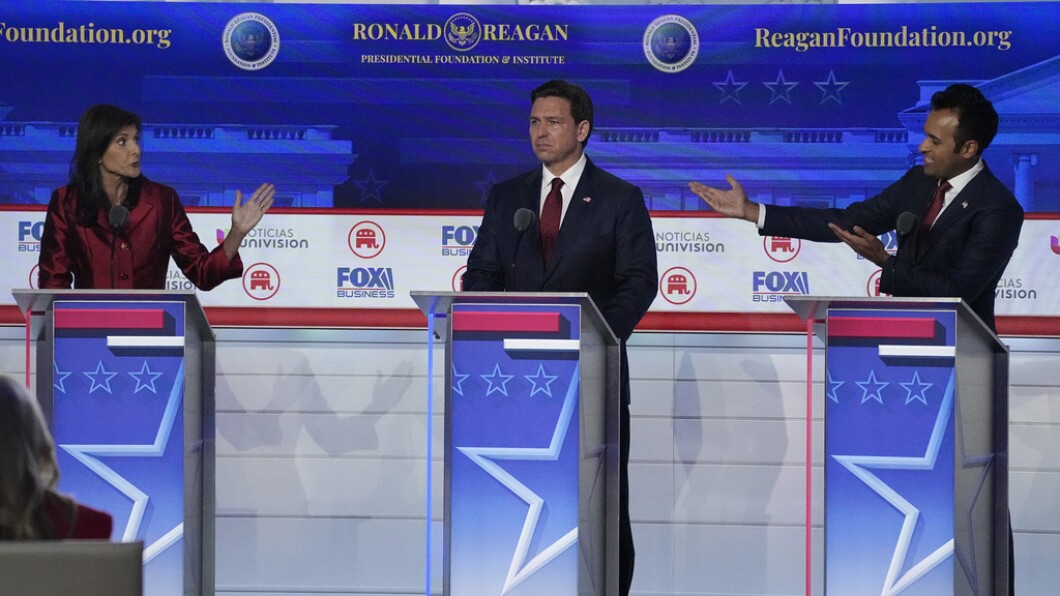
A majority of Republicans in Congress continue to back aiding and arming Ukraine, in stark contrast to GOP presidential primary voters who overwhelmingly appear to favor candidates who want to end or lessen that support.
With Congress on the verge of a federal shutdown, aid to Ukraine has become a sticking point, with a vocal and growing minority of House Republicans willing to go through a stoppage in order to stop aid to Ukraine.
REPUBLICAN DEBATE: TOP THREE TAKEAWAYS FROM THE CANDIDATES’ LATEST MEETING
The House ultimately voted 311-117 to provide $300 million in aid to Ukraine in a stand-alone bill on Thursday, with every vote against the measure coming from the GOP.
The funding had been stripped from the annual defense spending bill in an effort to appease those hard-line conservatives who voted against the measure anyway. Earlier in the process of getting it passed, 93 House Republicans voted in favor of a failed amendment from Rep. Matt Gaetz (R-FL) that ultimately would have prohibited security assistance to Ukraine, while 104 voted in favor of another failed amendment from Rep. Andy Biggs (R-AZ) that would have stripped the Ukraine money from the larger spending bill, which ultimately happened anyway and passed as a stand-alone.
Despite the vocal minority, most of the party not only supports aiding Ukraine but believes President Joe Biden is only doing enough to prevent a Ukrainian defeat, not to assist in their victory.
But that shrinking majority is seemingly at odds with their base, which, based on most polling of the GOP presidential primary, is gravitating toward candidates who seemingly want to lessen such assistance to Ukraine.
In this week’s second presidential primary debate, the majority of candidates, mainly those with limited support, aggressively defended such assistance and insisted it’s vital for U.S. national security.
Former President Donald Trump, the overwhelming favorite for the nomination, has said he’d be able to end the war in 24 hours, though the only plans he’s shared publicly on how he’d do that include threatening to cut off aid to Ukrainian President Volodymyr Zelensky and telling Russian leader Vladimir Putin that he’d increase aid to Kyiv.
“I know Zelensky very well, and I know Putin very well, even better. And I had a good relationship, very good with both of them. I would tell Zelensky no more. You got to make a deal. I would tell Putin, if you don’t make a deal, we’re going to give him a lot. We’re going to [give Ukraine] more than they ever got if we have to. I will have the deal done in one day. One day,” Trump said in August.
Gov. Ron DeSantis (R-FL), generally polling in second at 14%, per RealClearPolitics, and entrepreneur Vivek Ramaswamy, currently in fourth place at 5.1%, both indicated on Wednesday night that they don’t support continuing aid to Ukraine as the Biden administration is currently doing.

“The reality is just because Putin is an evil dictator does not mean that Ukraine is good,” Ramaswamy said during the debate, while the Florida governor was critical of Europe’s assistance to Ukraine, saying, “I’m going to have Europe step up and do their job.”
More traditional Republicans, such as former South Carolina Gov. Nikki Haley, Sen. Tim Scott (R-SC), former New Jersey Gov. Chris Christie, and former Vice President Mike Pence all said at the debate that continuing to help Ukraine is in the U.S.’s national security interest. For the most part, no candidate in this group reaches double digits in presidential polling.
CLICK HERE TO READ MORE FROM THE WASHINGTON EXAMINER
“The naivete on the stage from some of these folks is extraordinary,” Christie said, while Scott confirmed that “degrading the Russian military” is in the U.S. national interest, adding it would “actually keep our homeland safer.”
The polling suggests that even if Trump doesn’t get the nomination, maintaining aid to Ukraine will likely be on the ballot come next November.





